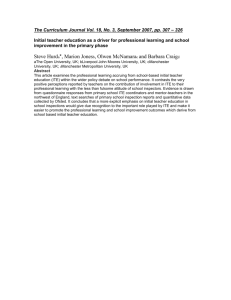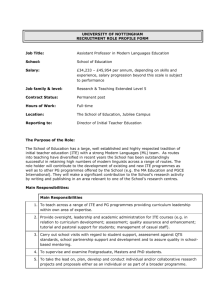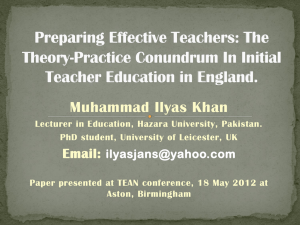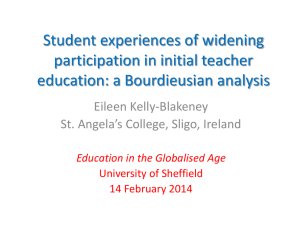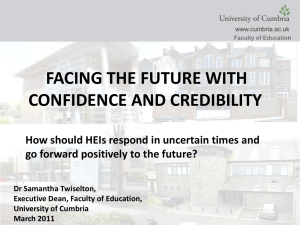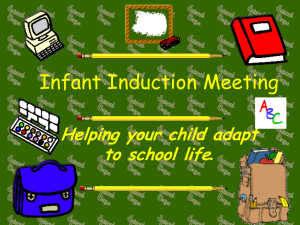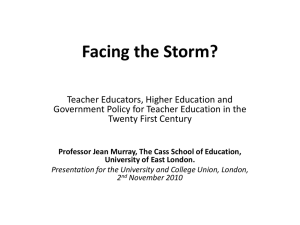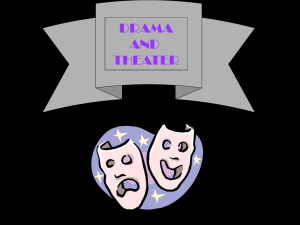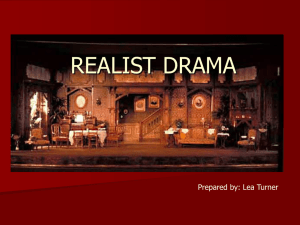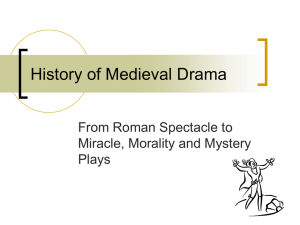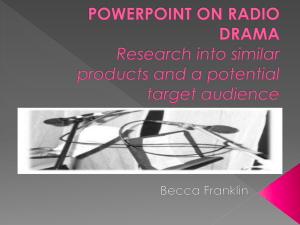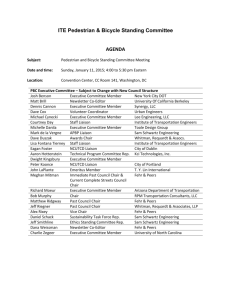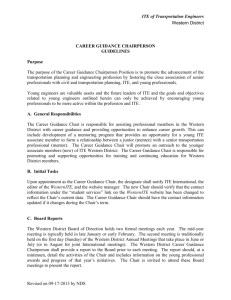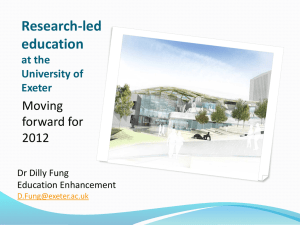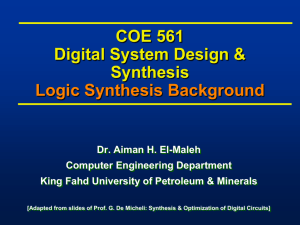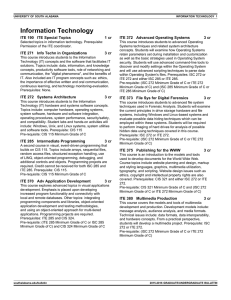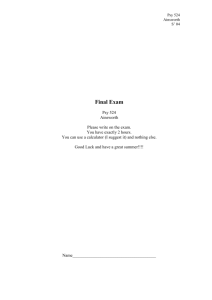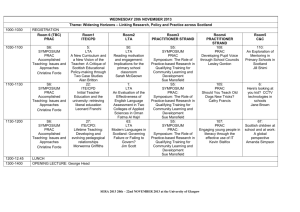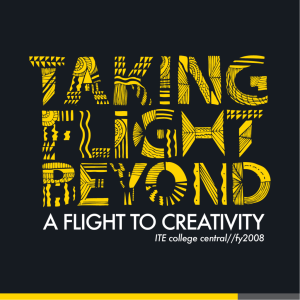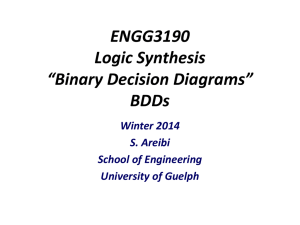Developing a Research Informed Pedagogy for ITE
advertisement
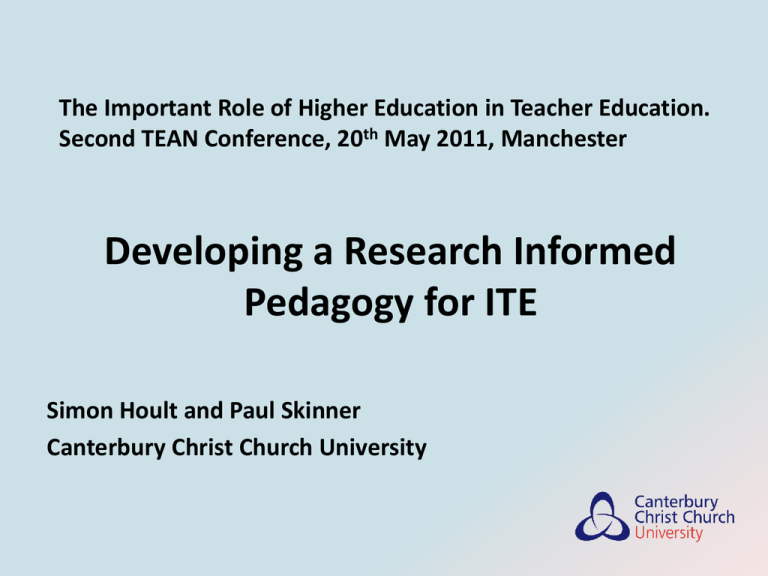
The Important Role of Higher Education in Teacher Education. Second TEAN Conference, 20th May 2011, Manchester Developing a Research Informed Pedagogy for ITE Simon Hoult and Paul Skinner Canterbury Christ Church University Aims 1. To explore the concept and suitability of higher education research informed teaching to inform ITE 2. To explore ways that learning in a ‘research mode’ may help ‘enact a pedagogy of ITE’ 3. To argue that university-led ITE partnerships are crucial in developing a critical and reflective approach to research informed pedagogy and ITE as a whole Enacting a pedagogy of teacher education 1. Making the tacit explicit... 2. in teaching teaching there is a pressing need...to be able to bring to the surface reactions, responses, decisions and moves that influence their teaching (p2) 3. We need to recognise how we respond to the problematic nature of teaching (Loughrin 2007) Teaching-Research Nexus Teaching can be: Research-led Research-oriented Research-based Research-informed (Griffiths 2004) Curriculum Design and the ResearchTeaching Nexus (after Healey 2005) Emphasis on published content Emphasis on published content Research-tutored Research-tutored Research-based Research-based Research-led Research-led Research-oriented Research-oriented Emphasison onreading reading Emphasis research/scholarlyworks works research/scholarly Emphasis on on learning learning Emphasis processes of of enquiry enquiry processes Emphasis Emphasison onstudents’ students’writing writing Emphasis Emphasis on on undertaking undertaking enquiry-based enquiry-based learning learning Students as receivers of Theory Students as receivers of Theory Emphasis Emphasis on on experienced experienced processes processes and and problems problems Students Students as as reflective reflective theory theory makers makers Learning in a research mode Society that is uncertainty, uncontrollability and unpredictability (Brew, 2006) Learning in a world of ‘supercomplexity’ (Barnett 2000) 1. Learning is tentative 2. Needs space and time 3. Problematising 4. Reflection/reflexiveness is key 5. Attending to emotions Articulating our principles of practice 1. Thinking like a teacher involves learning to see teaching from the view point of the learner 2. Prospective teachers need opportunities to see into the thinking like a teacher of experienced others 3. Prospective teachers need to try out thinking like a teacher in order to develop their thinking as a teacher 4. Prospective teachers need scaffolding 5. Developing responsive relationships is at the heart of learning to think like a teacher and at the heart of supporting our students Crowe and Berry (2007) Research means so many different things... • By Discipline • By Paradigm • By individual Education research does not have to remain within the dominant expectations of social science research : •Using fiction alongside/instead of ‘real’ data •Creative writing •‘Performing research’ - e.g. Art/DT practitioner research and Drama... Drama as Pedagogic Tool • The Classroom as Social Construct: Control and Management Strategies • Brook’s The Empty Space as Safe Space • Jung to Propp and Archetypal Roles • Forum Theatre/ Audience as ‘Lesson Observer’ • ‘Teaching Stars’ and Film / Education • The Classroom as Stage: From Comfort Zone to the Liminal Zone of Transformation Adults as Children • Play as Piaget’s Playfulness • Vygotsky’s ZPD as ‘The place where the child and the adult meet’ (Veraksa) • ‘The magnifying glass of the adult body’ (Potter) • Moral Panic: Teenager as ‘Terrorist’ • The Imperatives of Empathy • ‘The Psychology of Return’ Lessons Learnt: The Tutor ‘The baggage we all bring to class, this No Man’s Land. If life’s a battlefield, the shrapnel our living embeds in each and every one of us...’ (Scene One, Introductions) Research-Informed Teaching Project • The use of drama to (re)create teaching and learning as Loughran’s site for enquiry • The energy of a research paradigm that challenges the technicalrational / social-scientific model through ‘informed fictions’ • The immediacy of theatre as an arena for Osborne’s ‘Lessons in feeling...’ • Role-play as a trusted methodology for (re)exploring, (re)creating; (re)presenting and (re) solving classroom chaos • An exercise in empathy and conflict-resolution through Forum Theatre and Boal’s spect-actors • ‘Constructed chaos’ and improvisation as the cauldron for an exploration of our classroom persona as teacher (professional identity) • The ‘art of anarchy’ as the site for an exploration of our remembered childhood persona as pupil (personal identity) Lessons Learnt: The Audience • ‘...it has to be the most powerful piece of learning I’ve been part of within the PGCE.’ (Director of 11-19 ITE) • ‘Pure genius. I’ve been thinking about it non-stop and I wanted to thank you. The script and the delivery were absolutely spot on.’ (English teacher) • ‘Fantastic stuff...excellent script and high energy performance...it was so like being in a classroom and yet great as drama also...No text book, however well written, can equal the immediacy of the experience, both for the actor and the audience...’ (PGCE Tutor) • ‘...thrilling. It worked very well as drama, but also as a very significant contribution to teacher education, both for actors and audience, for staff as well as students...’ (Professor of Inclusive and International Education) NoManzland: Loughran’s Legacy (2007) • The problematic nature of teaching: ‘Chaos Theory’ and ‘the uncertainty of practice’ • The tacit made explicit: ‘..teaching is much more than well-rehearsed scripts and routines’...Improvisation and Hot-Seating • Teaching as Relationship: ‘Shared Learning’; the ‘Learner’s Perspective’; ‘Vulnerability’; and the ‘Primacy of Relationship’ (Bullock 2007) • The ‘Tyranny of Talk’ cf the ‘Energy of Action’; the ‘Respite of Reflection’; and our ‘Inner Selves’ (Korthagen and Verkuyl 2007) NoManzland: Loughran’s Legacy (2007) • The student teacher can be armed against socialization into established patterns of school practice. The student teacher must first gain some idea of who he or she is, of what he or she wants, and, above all, the ways in which one can take responsibility for one’s own learning’ (Korthagen, 1988, p39) • Jung’s individuation: ‘The process by which human beings become aware of their own personal qualities, learn to handle those qualities in their contact with the outside world, and ultimately become an individual distinguishable from other human beings.’ (Korthagen and Verkuyl, 2007) • Individuation, Archetypal Roles and Teaching and Learning as The Hero’s Journey (Campbell The value the research teaching nexus can be expressed in three perspectives: 1. Experientially 2. Conceptually 3. Operationally (Zetter 2002) Thanks for listening. Please feel free to contact us about any aspects of our presentation: simon.hoult@canterbury.ac.uk paul.skinner@canterbury.ac.uk
